Overriding Interests in Apparent Occupation
VerifiedAdded on 2022/10/01
|10
|1998
|373
AI Summary
This document discusses the Land Registration Act 2002 and its effect on overriding interests in England and Wales. It also analyzes the case of Williams & Glyn’s Bank Ltd. V Boland and the importance of actual occupation for interests to be overriding.
Contribute Materials
Your contribution can guide someone’s learning journey. Share your
documents today.
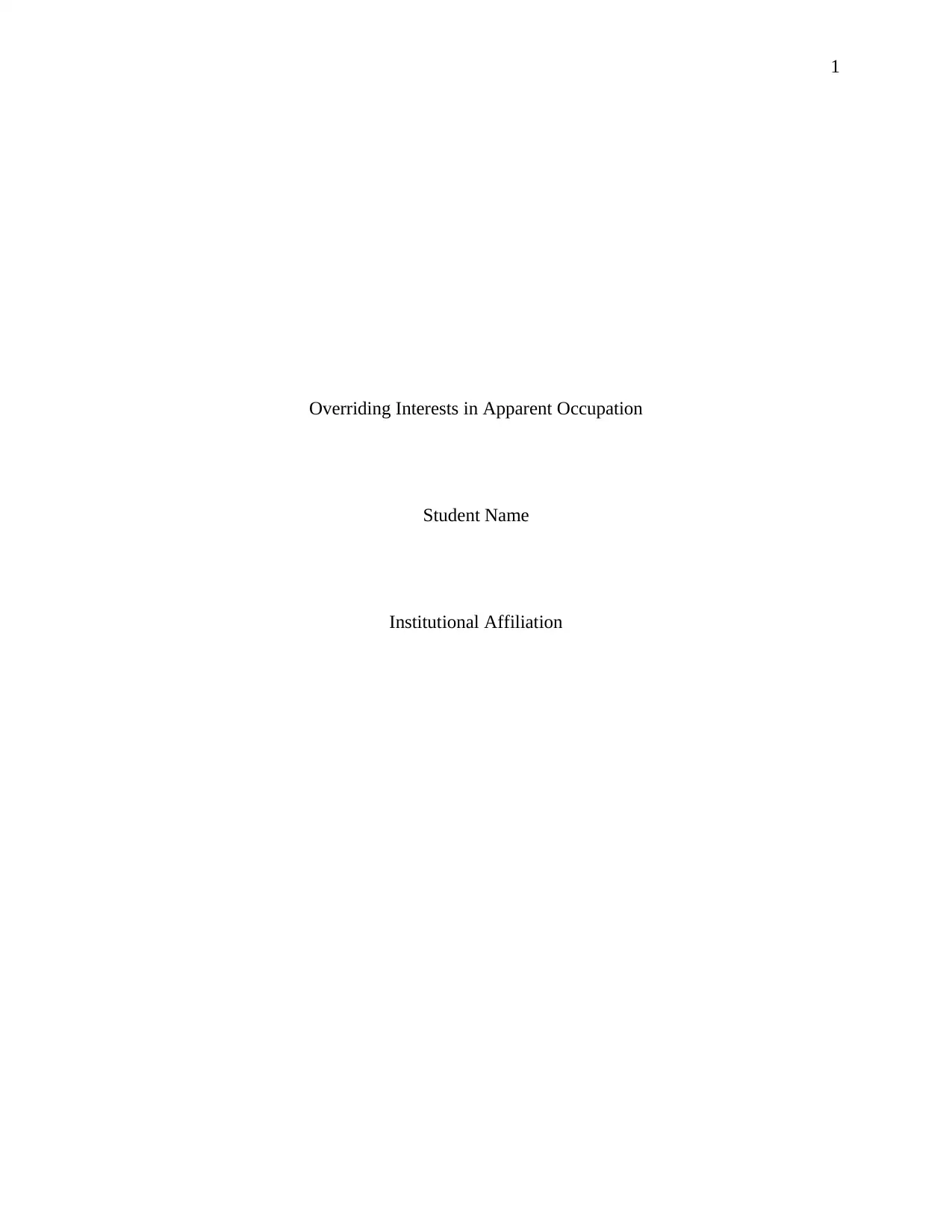
1
Overriding Interests in Apparent Occupation
Student Name
Institutional Affiliation
Overriding Interests in Apparent Occupation
Student Name
Institutional Affiliation
Secure Best Marks with AI Grader
Need help grading? Try our AI Grader for instant feedback on your assignments.
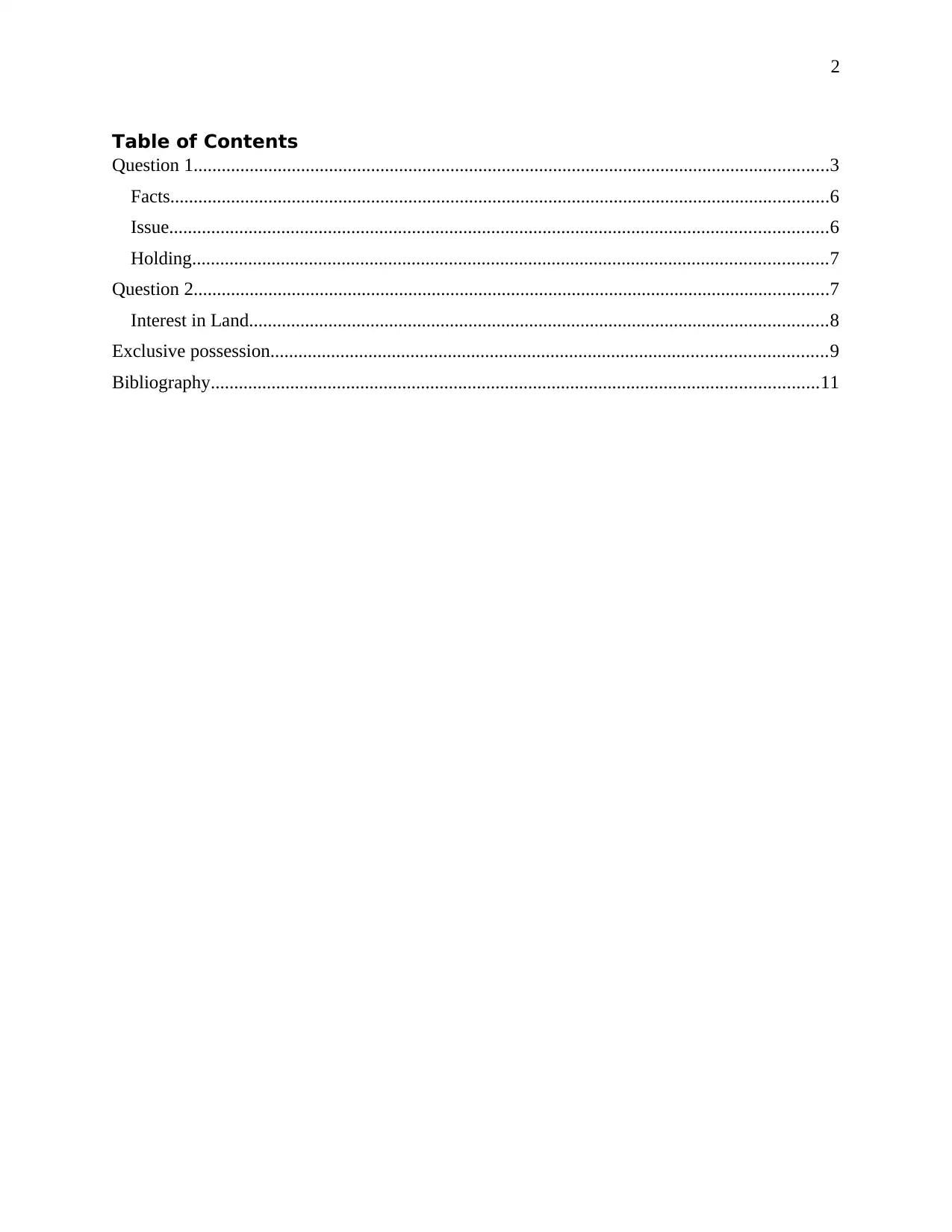
2
Table of Contents
Question 1........................................................................................................................................3
Facts.............................................................................................................................................6
Issue.............................................................................................................................................6
Holding........................................................................................................................................7
Question 2........................................................................................................................................7
Interest in Land............................................................................................................................8
Exclusive possession.......................................................................................................................9
Bibliography..................................................................................................................................11
Table of Contents
Question 1........................................................................................................................................3
Facts.............................................................................................................................................6
Issue.............................................................................................................................................6
Holding........................................................................................................................................7
Question 2........................................................................................................................................7
Interest in Land............................................................................................................................8
Exclusive possession.......................................................................................................................9
Bibliography..................................................................................................................................11
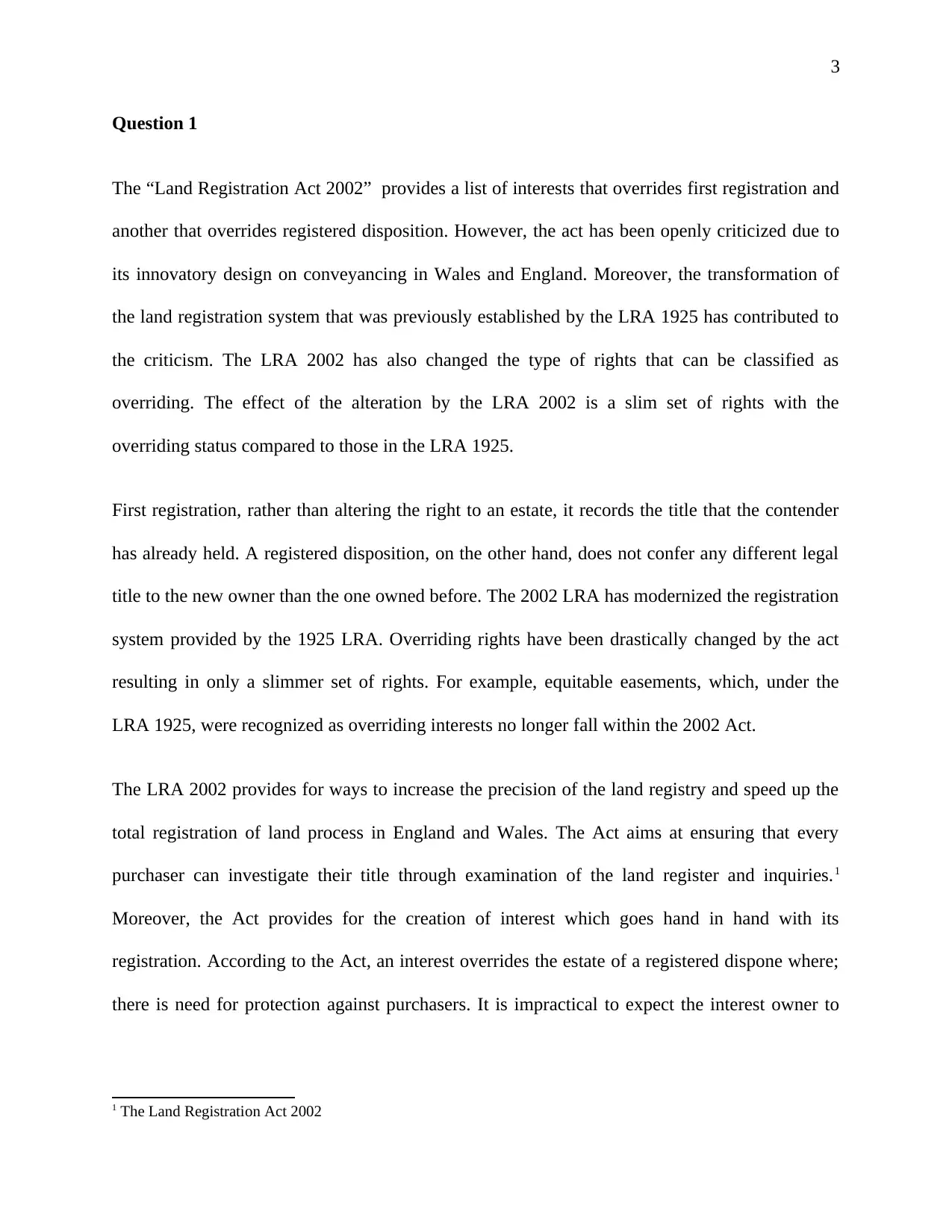
3
Question 1
The “Land Registration Act 2002” provides a list of interests that overrides first registration and
another that overrides registered disposition. However, the act has been openly criticized due to
its innovatory design on conveyancing in Wales and England. Moreover, the transformation of
the land registration system that was previously established by the LRA 1925 has contributed to
the criticism. The LRA 2002 has also changed the type of rights that can be classified as
overriding. The effect of the alteration by the LRA 2002 is a slim set of rights with the
overriding status compared to those in the LRA 1925.
First registration, rather than altering the right to an estate, it records the title that the contender
has already held. A registered disposition, on the other hand, does not confer any different legal
title to the new owner than the one owned before. The 2002 LRA has modernized the registration
system provided by the 1925 LRA. Overriding rights have been drastically changed by the act
resulting in only a slimmer set of rights. For example, equitable easements, which, under the
LRA 1925, were recognized as overriding interests no longer fall within the 2002 Act.
The LRA 2002 provides for ways to increase the precision of the land registry and speed up the
total registration of land process in England and Wales. The Act aims at ensuring that every
purchaser can investigate their title through examination of the land register and inquiries.1
Moreover, the Act provides for the creation of interest which goes hand in hand with its
registration. According to the Act, an interest overrides the estate of a registered dispone where;
there is need for protection against purchasers. It is impractical to expect the interest owner to
1 The Land Registration Act 2002
Question 1
The “Land Registration Act 2002” provides a list of interests that overrides first registration and
another that overrides registered disposition. However, the act has been openly criticized due to
its innovatory design on conveyancing in Wales and England. Moreover, the transformation of
the land registration system that was previously established by the LRA 1925 has contributed to
the criticism. The LRA 2002 has also changed the type of rights that can be classified as
overriding. The effect of the alteration by the LRA 2002 is a slim set of rights with the
overriding status compared to those in the LRA 1925.
First registration, rather than altering the right to an estate, it records the title that the contender
has already held. A registered disposition, on the other hand, does not confer any different legal
title to the new owner than the one owned before. The 2002 LRA has modernized the registration
system provided by the 1925 LRA. Overriding rights have been drastically changed by the act
resulting in only a slimmer set of rights. For example, equitable easements, which, under the
LRA 1925, were recognized as overriding interests no longer fall within the 2002 Act.
The LRA 2002 provides for ways to increase the precision of the land registry and speed up the
total registration of land process in England and Wales. The Act aims at ensuring that every
purchaser can investigate their title through examination of the land register and inquiries.1
Moreover, the Act provides for the creation of interest which goes hand in hand with its
registration. According to the Act, an interest overrides the estate of a registered dispone where;
there is need for protection against purchasers. It is impractical to expect the interest owner to
1 The Land Registration Act 2002
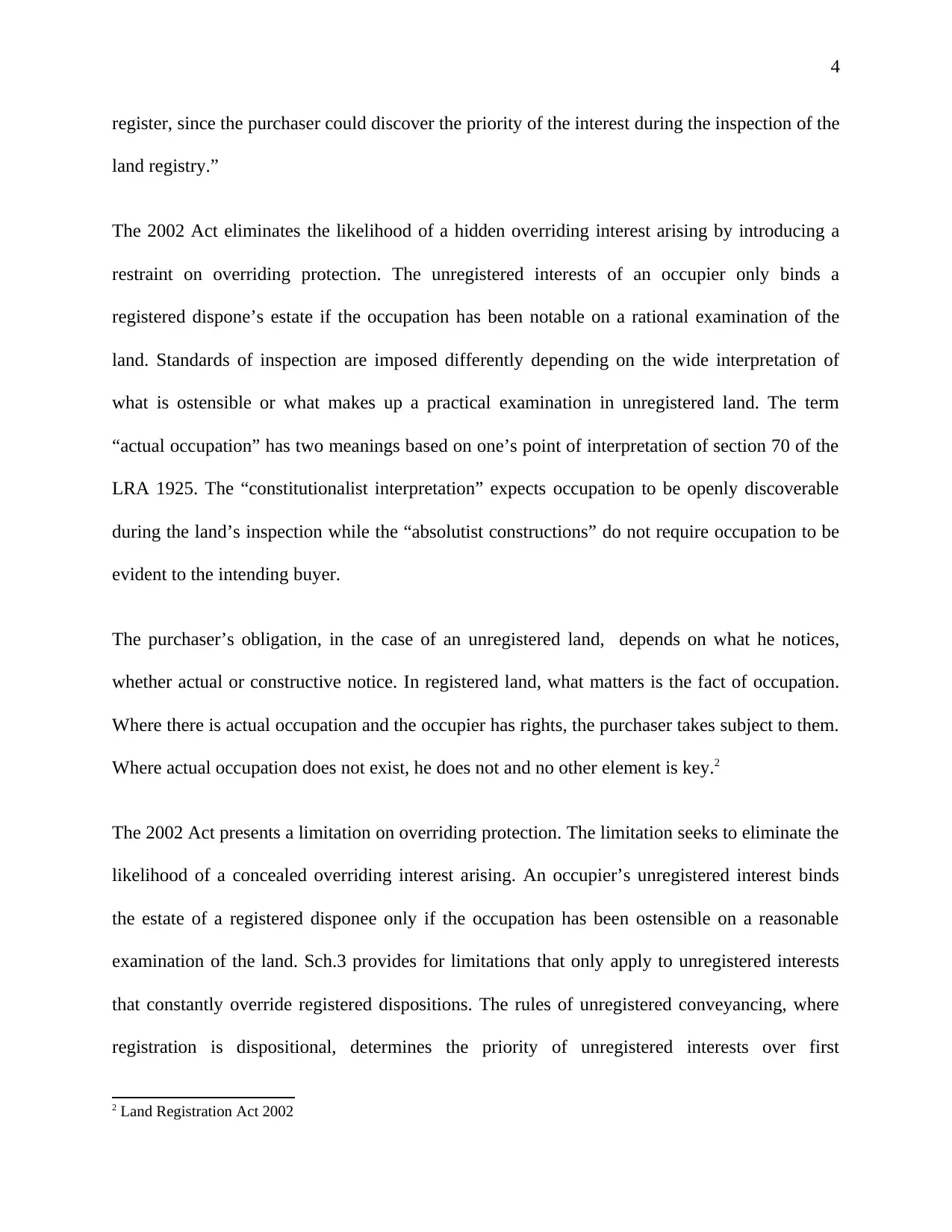
4
register, since the purchaser could discover the priority of the interest during the inspection of the
land registry.”
The 2002 Act eliminates the likelihood of a hidden overriding interest arising by introducing a
restraint on overriding protection. The unregistered interests of an occupier only binds a
registered dispone’s estate if the occupation has been notable on a rational examination of the
land. Standards of inspection are imposed differently depending on the wide interpretation of
what is ostensible or what makes up a practical examination in unregistered land. The term
“actual occupation” has two meanings based on one’s point of interpretation of section 70 of the
LRA 1925. The “constitutionalist interpretation” expects occupation to be openly discoverable
during the land’s inspection while the “absolutist constructions” do not require occupation to be
evident to the intending buyer.
The purchaser’s obligation, in the case of an unregistered land, depends on what he notices,
whether actual or constructive notice. In registered land, what matters is the fact of occupation.
Where there is actual occupation and the occupier has rights, the purchaser takes subject to them.
Where actual occupation does not exist, he does not and no other element is key.2
The 2002 Act presents a limitation on overriding protection. The limitation seeks to eliminate the
likelihood of a concealed overriding interest arising. An occupier’s unregistered interest binds
the estate of a registered disponee only if the occupation has been ostensible on a reasonable
examination of the land. Sch.3 provides for limitations that only apply to unregistered interests
that constantly override registered dispositions. The rules of unregistered conveyancing, where
registration is dispositional, determines the priority of unregistered interests over first
2 Land Registration Act 2002
register, since the purchaser could discover the priority of the interest during the inspection of the
land registry.”
The 2002 Act eliminates the likelihood of a hidden overriding interest arising by introducing a
restraint on overriding protection. The unregistered interests of an occupier only binds a
registered dispone’s estate if the occupation has been notable on a rational examination of the
land. Standards of inspection are imposed differently depending on the wide interpretation of
what is ostensible or what makes up a practical examination in unregistered land. The term
“actual occupation” has two meanings based on one’s point of interpretation of section 70 of the
LRA 1925. The “constitutionalist interpretation” expects occupation to be openly discoverable
during the land’s inspection while the “absolutist constructions” do not require occupation to be
evident to the intending buyer.
The purchaser’s obligation, in the case of an unregistered land, depends on what he notices,
whether actual or constructive notice. In registered land, what matters is the fact of occupation.
Where there is actual occupation and the occupier has rights, the purchaser takes subject to them.
Where actual occupation does not exist, he does not and no other element is key.2
The 2002 Act presents a limitation on overriding protection. The limitation seeks to eliminate the
likelihood of a concealed overriding interest arising. An occupier’s unregistered interest binds
the estate of a registered disponee only if the occupation has been ostensible on a reasonable
examination of the land. Sch.3 provides for limitations that only apply to unregistered interests
that constantly override registered dispositions. The rules of unregistered conveyancing, where
registration is dispositional, determines the priority of unregistered interests over first
2 Land Registration Act 2002
Secure Best Marks with AI Grader
Need help grading? Try our AI Grader for instant feedback on your assignments.
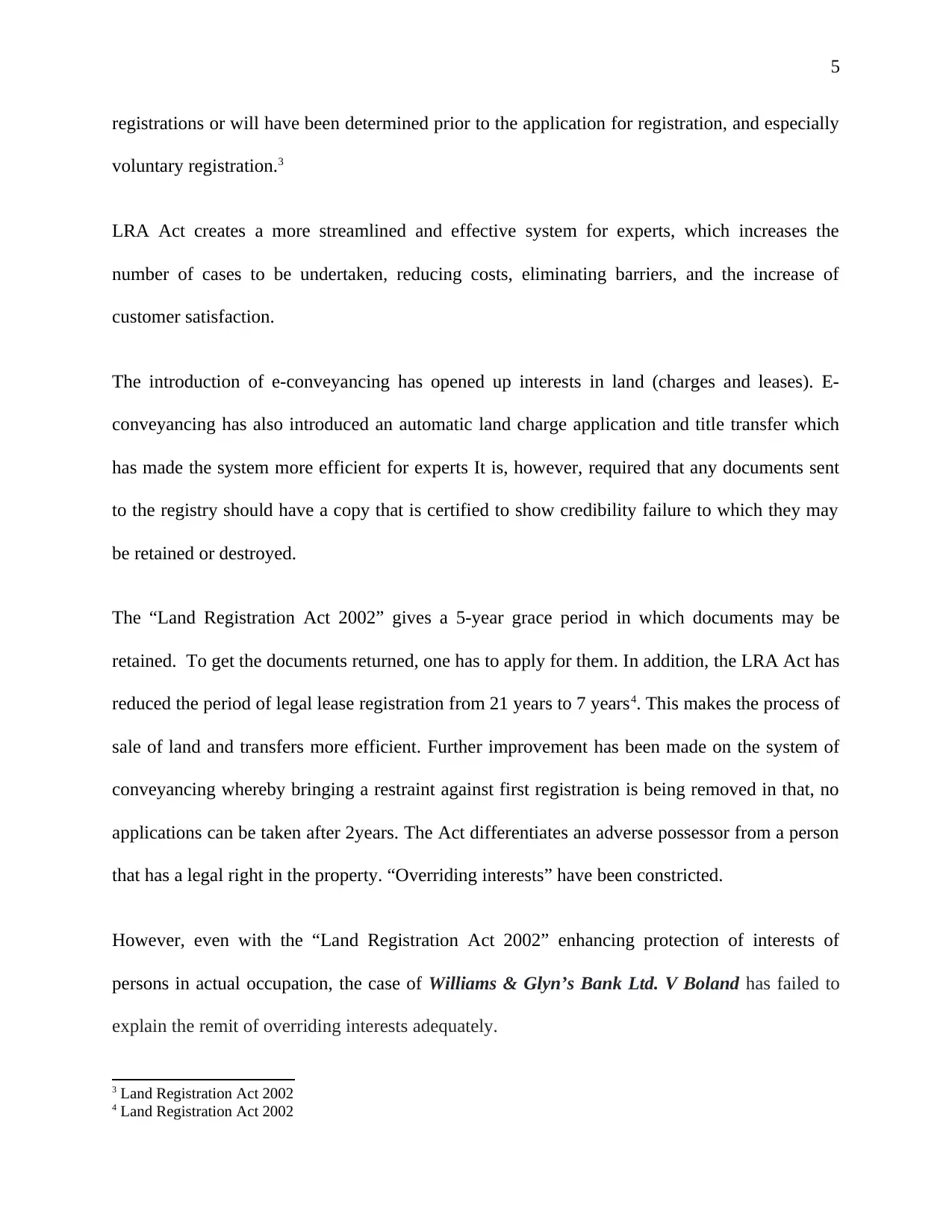
5
registrations or will have been determined prior to the application for registration, and especially
voluntary registration.3
LRA Act creates a more streamlined and effective system for experts, which increases the
number of cases to be undertaken, reducing costs, eliminating barriers, and the increase of
customer satisfaction.
The introduction of e-conveyancing has opened up interests in land (charges and leases). E-
conveyancing has also introduced an automatic land charge application and title transfer which
has made the system more efficient for experts It is, however, required that any documents sent
to the registry should have a copy that is certified to show credibility failure to which they may
be retained or destroyed.
The “Land Registration Act 2002” gives a 5-year grace period in which documents may be
retained. To get the documents returned, one has to apply for them. In addition, the LRA Act has
reduced the period of legal lease registration from 21 years to 7 years4. This makes the process of
sale of land and transfers more efficient. Further improvement has been made on the system of
conveyancing whereby bringing a restraint against first registration is being removed in that, no
applications can be taken after 2years. The Act differentiates an adverse possessor from a person
that has a legal right in the property. “Overriding interests” have been constricted.
However, even with the “Land Registration Act 2002” enhancing protection of interests of
persons in actual occupation, the case of Williams & Glyn’s Bank Ltd. V Boland has failed to
explain the remit of overriding interests adequately.
3 Land Registration Act 2002
4 Land Registration Act 2002
registrations or will have been determined prior to the application for registration, and especially
voluntary registration.3
LRA Act creates a more streamlined and effective system for experts, which increases the
number of cases to be undertaken, reducing costs, eliminating barriers, and the increase of
customer satisfaction.
The introduction of e-conveyancing has opened up interests in land (charges and leases). E-
conveyancing has also introduced an automatic land charge application and title transfer which
has made the system more efficient for experts It is, however, required that any documents sent
to the registry should have a copy that is certified to show credibility failure to which they may
be retained or destroyed.
The “Land Registration Act 2002” gives a 5-year grace period in which documents may be
retained. To get the documents returned, one has to apply for them. In addition, the LRA Act has
reduced the period of legal lease registration from 21 years to 7 years4. This makes the process of
sale of land and transfers more efficient. Further improvement has been made on the system of
conveyancing whereby bringing a restraint against first registration is being removed in that, no
applications can be taken after 2years. The Act differentiates an adverse possessor from a person
that has a legal right in the property. “Overriding interests” have been constricted.
However, even with the “Land Registration Act 2002” enhancing protection of interests of
persons in actual occupation, the case of Williams & Glyn’s Bank Ltd. V Boland has failed to
explain the remit of overriding interests adequately.
3 Land Registration Act 2002
4 Land Registration Act 2002
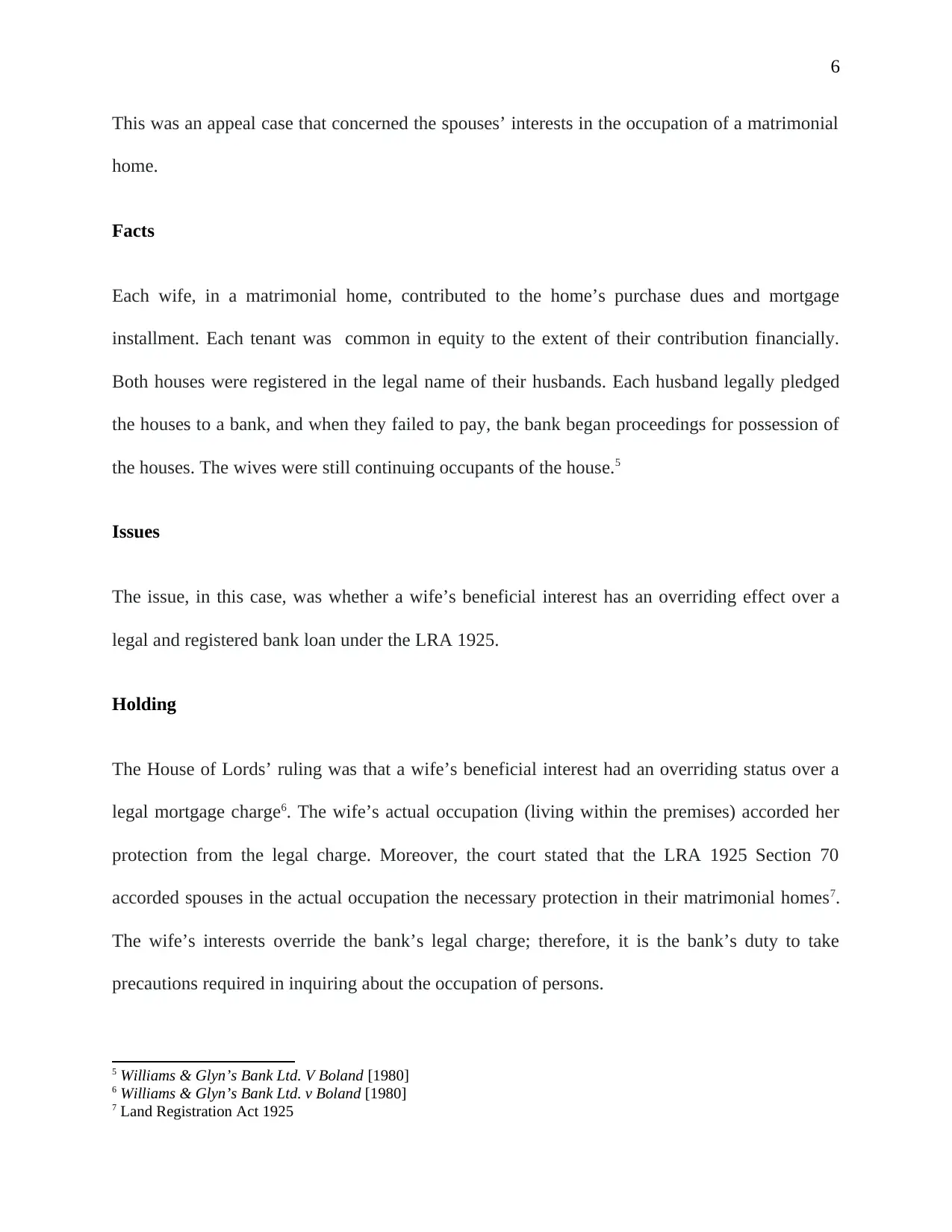
6
This was an appeal case that concerned the spouses’ interests in the occupation of a matrimonial
home.
Facts
Each wife, in a matrimonial home, contributed to the home’s purchase dues and mortgage
installment. Each tenant was common in equity to the extent of their contribution financially.
Both houses were registered in the legal name of their husbands. Each husband legally pledged
the houses to a bank, and when they failed to pay, the bank began proceedings for possession of
the houses. The wives were still continuing occupants of the house.5
Issues
The issue, in this case, was whether a wife’s beneficial interest has an overriding effect over a
legal and registered bank loan under the LRA 1925.
Holding
The House of Lords’ ruling was that a wife’s beneficial interest had an overriding status over a
legal mortgage charge6. The wife’s actual occupation (living within the premises) accorded her
protection from the legal charge. Moreover, the court stated that the LRA 1925 Section 70
accorded spouses in the actual occupation the necessary protection in their matrimonial homes7.
The wife’s interests override the bank’s legal charge; therefore, it is the bank’s duty to take
precautions required in inquiring about the occupation of persons.
5 Williams & Glyn’s Bank Ltd. V Boland [1980]
6 Williams & Glyn’s Bank Ltd. v Boland [1980]
7 Land Registration Act 1925
This was an appeal case that concerned the spouses’ interests in the occupation of a matrimonial
home.
Facts
Each wife, in a matrimonial home, contributed to the home’s purchase dues and mortgage
installment. Each tenant was common in equity to the extent of their contribution financially.
Both houses were registered in the legal name of their husbands. Each husband legally pledged
the houses to a bank, and when they failed to pay, the bank began proceedings for possession of
the houses. The wives were still continuing occupants of the house.5
Issues
The issue, in this case, was whether a wife’s beneficial interest has an overriding effect over a
legal and registered bank loan under the LRA 1925.
Holding
The House of Lords’ ruling was that a wife’s beneficial interest had an overriding status over a
legal mortgage charge6. The wife’s actual occupation (living within the premises) accorded her
protection from the legal charge. Moreover, the court stated that the LRA 1925 Section 70
accorded spouses in the actual occupation the necessary protection in their matrimonial homes7.
The wife’s interests override the bank’s legal charge; therefore, it is the bank’s duty to take
precautions required in inquiring about the occupation of persons.
5 Williams & Glyn’s Bank Ltd. V Boland [1980]
6 Williams & Glyn’s Bank Ltd. v Boland [1980]
7 Land Registration Act 1925
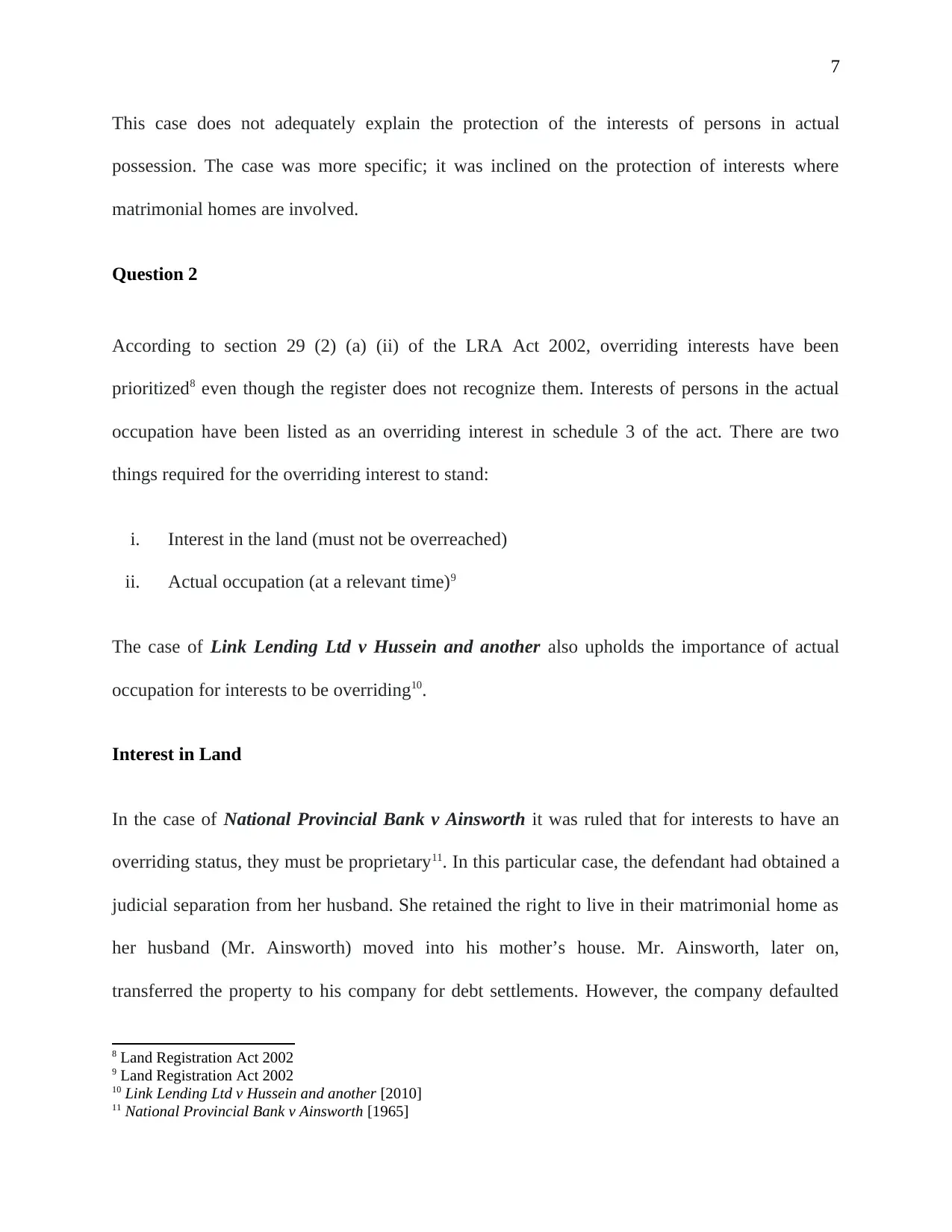
7
This case does not adequately explain the protection of the interests of persons in actual
possession. The case was more specific; it was inclined on the protection of interests where
matrimonial homes are involved.
Question 2
According to section 29 (2) (a) (ii) of the LRA Act 2002, overriding interests have been
prioritized8 even though the register does not recognize them. Interests of persons in the actual
occupation have been listed as an overriding interest in schedule 3 of the act. There are two
things required for the overriding interest to stand:
i. Interest in the land (must not be overreached)
ii. Actual occupation (at a relevant time)9
The case of Link Lending Ltd v Hussein and another also upholds the importance of actual
occupation for interests to be overriding10.
Interest in Land
In the case of National Provincial Bank v Ainsworth it was ruled that for interests to have an
overriding status, they must be proprietary11. In this particular case, the defendant had obtained a
judicial separation from her husband. She retained the right to live in their matrimonial home as
her husband (Mr. Ainsworth) moved into his mother’s house. Mr. Ainsworth, later on,
transferred the property to his company for debt settlements. However, the company defaulted
8 Land Registration Act 2002
9 Land Registration Act 2002
10 Link Lending Ltd v Hussein and another [2010]
11 National Provincial Bank v Ainsworth [1965]
This case does not adequately explain the protection of the interests of persons in actual
possession. The case was more specific; it was inclined on the protection of interests where
matrimonial homes are involved.
Question 2
According to section 29 (2) (a) (ii) of the LRA Act 2002, overriding interests have been
prioritized8 even though the register does not recognize them. Interests of persons in the actual
occupation have been listed as an overriding interest in schedule 3 of the act. There are two
things required for the overriding interest to stand:
i. Interest in the land (must not be overreached)
ii. Actual occupation (at a relevant time)9
The case of Link Lending Ltd v Hussein and another also upholds the importance of actual
occupation for interests to be overriding10.
Interest in Land
In the case of National Provincial Bank v Ainsworth it was ruled that for interests to have an
overriding status, they must be proprietary11. In this particular case, the defendant had obtained a
judicial separation from her husband. She retained the right to live in their matrimonial home as
her husband (Mr. Ainsworth) moved into his mother’s house. Mr. Ainsworth, later on,
transferred the property to his company for debt settlements. However, the company defaulted
8 Land Registration Act 2002
9 Land Registration Act 2002
10 Link Lending Ltd v Hussein and another [2010]
11 National Provincial Bank v Ainsworth [1965]
Paraphrase This Document
Need a fresh take? Get an instant paraphrase of this document with our AI Paraphraser
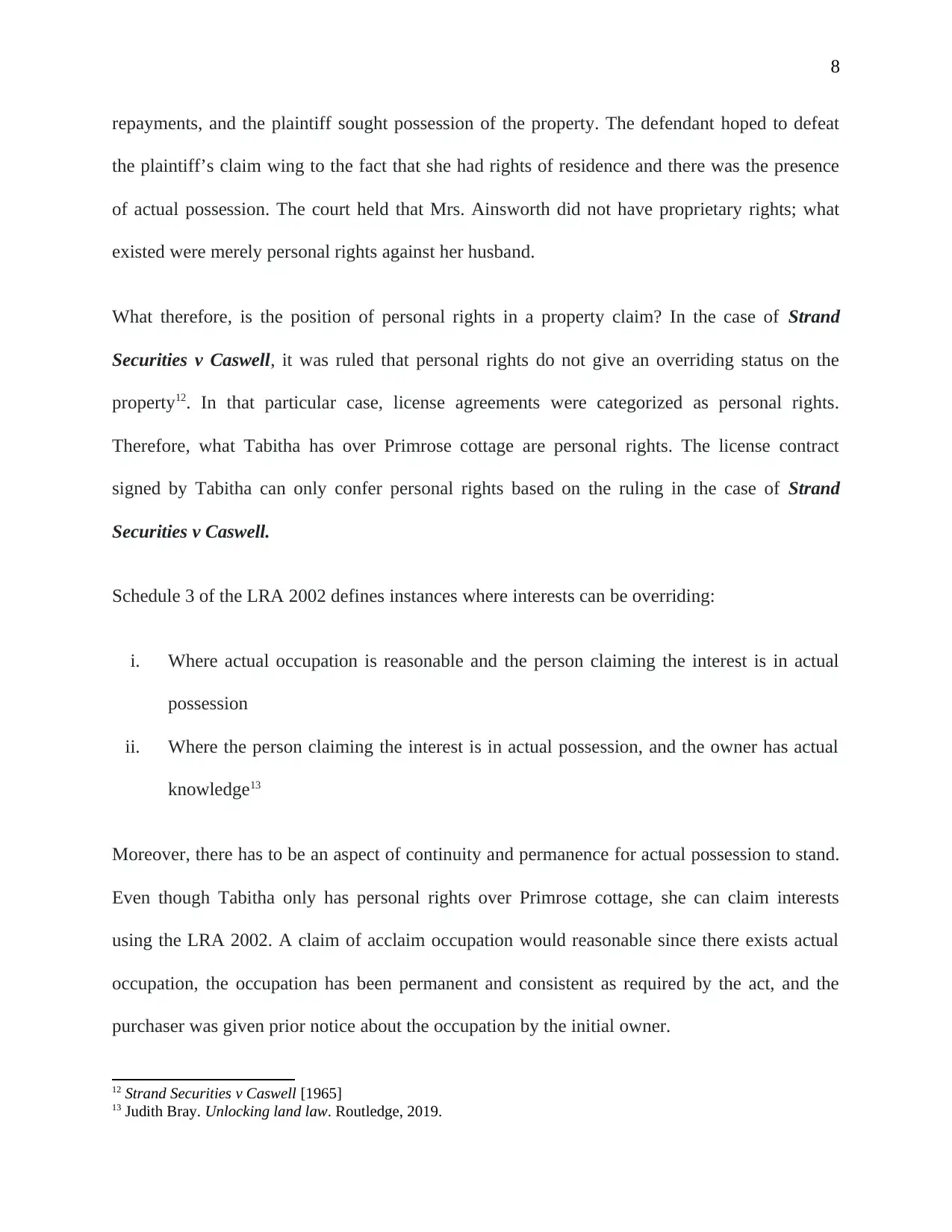
8
repayments, and the plaintiff sought possession of the property. The defendant hoped to defeat
the plaintiff’s claim wing to the fact that she had rights of residence and there was the presence
of actual possession. The court held that Mrs. Ainsworth did not have proprietary rights; what
existed were merely personal rights against her husband.
What therefore, is the position of personal rights in a property claim? In the case of Strand
Securities v Caswell, it was ruled that personal rights do not give an overriding status on the
property12. In that particular case, license agreements were categorized as personal rights.
Therefore, what Tabitha has over Primrose cottage are personal rights. The license contract
signed by Tabitha can only confer personal rights based on the ruling in the case of Strand
Securities v Caswell.
Schedule 3 of the LRA 2002 defines instances where interests can be overriding:
i. Where actual occupation is reasonable and the person claiming the interest is in actual
possession
ii. Where the person claiming the interest is in actual possession, and the owner has actual
knowledge13
Moreover, there has to be an aspect of continuity and permanence for actual possession to stand.
Even though Tabitha only has personal rights over Primrose cottage, she can claim interests
using the LRA 2002. A claim of acclaim occupation would reasonable since there exists actual
occupation, the occupation has been permanent and consistent as required by the act, and the
purchaser was given prior notice about the occupation by the initial owner.
12 Strand Securities v Caswell [1965]
13 Judith Bray. Unlocking land law. Routledge, 2019.
repayments, and the plaintiff sought possession of the property. The defendant hoped to defeat
the plaintiff’s claim wing to the fact that she had rights of residence and there was the presence
of actual possession. The court held that Mrs. Ainsworth did not have proprietary rights; what
existed were merely personal rights against her husband.
What therefore, is the position of personal rights in a property claim? In the case of Strand
Securities v Caswell, it was ruled that personal rights do not give an overriding status on the
property12. In that particular case, license agreements were categorized as personal rights.
Therefore, what Tabitha has over Primrose cottage are personal rights. The license contract
signed by Tabitha can only confer personal rights based on the ruling in the case of Strand
Securities v Caswell.
Schedule 3 of the LRA 2002 defines instances where interests can be overriding:
i. Where actual occupation is reasonable and the person claiming the interest is in actual
possession
ii. Where the person claiming the interest is in actual possession, and the owner has actual
knowledge13
Moreover, there has to be an aspect of continuity and permanence for actual possession to stand.
Even though Tabitha only has personal rights over Primrose cottage, she can claim interests
using the LRA 2002. A claim of acclaim occupation would reasonable since there exists actual
occupation, the occupation has been permanent and consistent as required by the act, and the
purchaser was given prior notice about the occupation by the initial owner.
12 Strand Securities v Caswell [1965]
13 Judith Bray. Unlocking land law. Routledge, 2019.
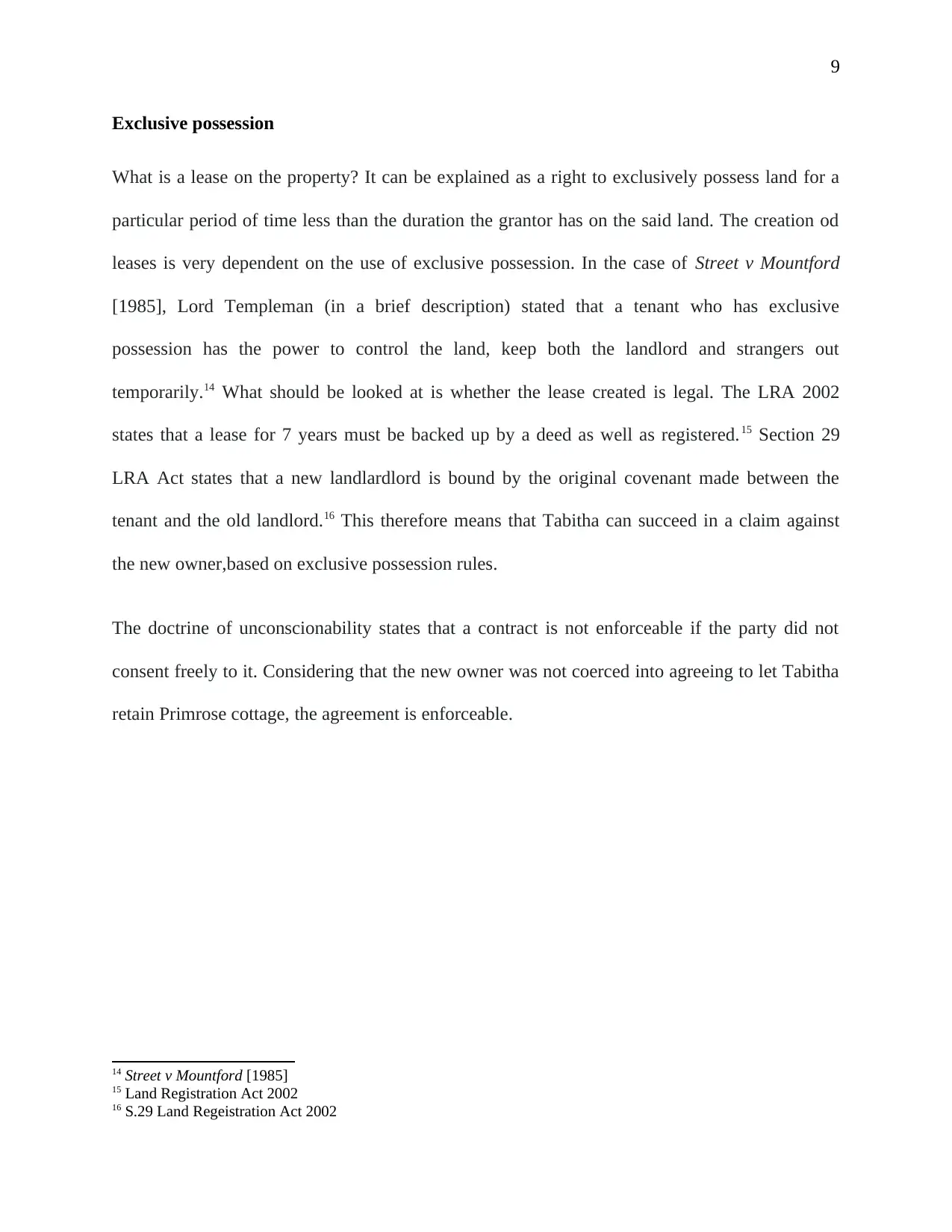
9
Exclusive possession
What is a lease on the property? It can be explained as a right to exclusively possess land for a
particular period of time less than the duration the grantor has on the said land. The creation od
leases is very dependent on the use of exclusive possession. In the case of Street v Mountford
[1985], Lord Templeman (in a brief description) stated that a tenant who has exclusive
possession has the power to control the land, keep both the landlord and strangers out
temporarily.14 What should be looked at is whether the lease created is legal. The LRA 2002
states that a lease for 7 years must be backed up by a deed as well as registered.15 Section 29
LRA Act states that a new landlardlord is bound by the original covenant made between the
tenant and the old landlord.16 This therefore means that Tabitha can succeed in a claim against
the new owner,based on exclusive possession rules.
The doctrine of unconscionability states that a contract is not enforceable if the party did not
consent freely to it. Considering that the new owner was not coerced into agreeing to let Tabitha
retain Primrose cottage, the agreement is enforceable.
14 Street v Mountford [1985]
15 Land Registration Act 2002
16 S.29 Land Regeistration Act 2002
Exclusive possession
What is a lease on the property? It can be explained as a right to exclusively possess land for a
particular period of time less than the duration the grantor has on the said land. The creation od
leases is very dependent on the use of exclusive possession. In the case of Street v Mountford
[1985], Lord Templeman (in a brief description) stated that a tenant who has exclusive
possession has the power to control the land, keep both the landlord and strangers out
temporarily.14 What should be looked at is whether the lease created is legal. The LRA 2002
states that a lease for 7 years must be backed up by a deed as well as registered.15 Section 29
LRA Act states that a new landlardlord is bound by the original covenant made between the
tenant and the old landlord.16 This therefore means that Tabitha can succeed in a claim against
the new owner,based on exclusive possession rules.
The doctrine of unconscionability states that a contract is not enforceable if the party did not
consent freely to it. Considering that the new owner was not coerced into agreeing to let Tabitha
retain Primrose cottage, the agreement is enforceable.
14 Street v Mountford [1985]
15 Land Registration Act 2002
16 S.29 Land Regeistration Act 2002
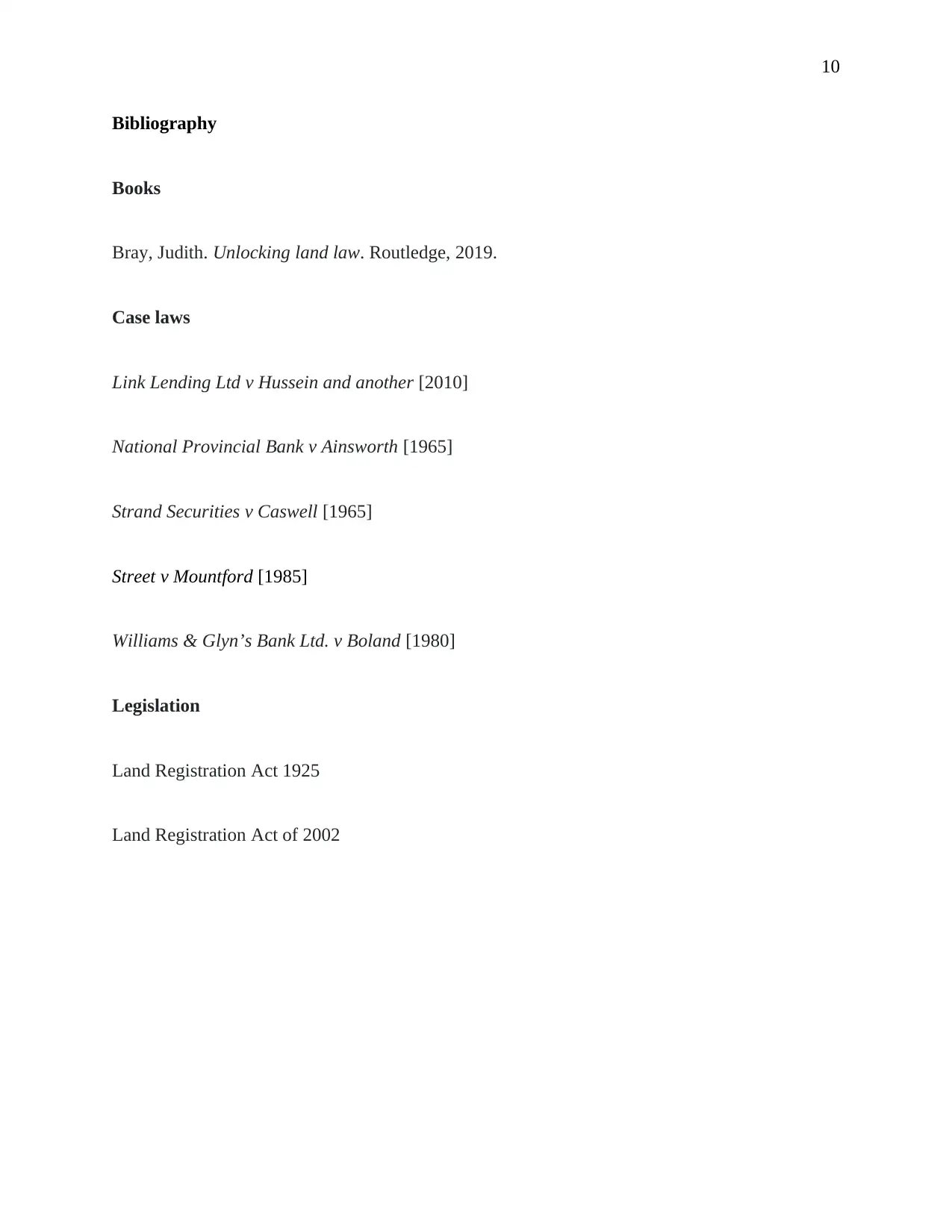
10
Bibliography
Books
Bray, Judith. Unlocking land law. Routledge, 2019.
Case laws
Link Lending Ltd v Hussein and another [2010]
National Provincial Bank v Ainsworth [1965]
Strand Securities v Caswell [1965]
Street v Mountford [1985]
Williams & Glyn’s Bank Ltd. v Boland [1980]
Legislation
Land Registration Act 1925
Land Registration Act of 2002
Bibliography
Books
Bray, Judith. Unlocking land law. Routledge, 2019.
Case laws
Link Lending Ltd v Hussein and another [2010]
National Provincial Bank v Ainsworth [1965]
Strand Securities v Caswell [1965]
Street v Mountford [1985]
Williams & Glyn’s Bank Ltd. v Boland [1980]
Legislation
Land Registration Act 1925
Land Registration Act of 2002
1 out of 10
Related Documents
Your All-in-One AI-Powered Toolkit for Academic Success.
+13062052269
info@desklib.com
Available 24*7 on WhatsApp / Email
![[object Object]](/_next/static/media/star-bottom.7253800d.svg)
Unlock your academic potential
© 2024 | Zucol Services PVT LTD | All rights reserved.





